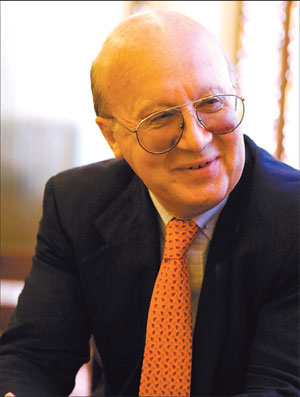Guardian of the Olympic Manifesto
By Tan Yingzi
Updated: 2008-06-06 09:47
France's Marquis Francois d'Amat shares the same dream of pursuing world peace through the Olympics as did his compatriot Pierre de Coubertin, the founder of the International Olympic Committee (IOC).
He discovered the original manuscript of the Olympic Manifesto written by Coubertin a century ago and he is the only person who has the right to authorize its circulation.
In 1892, Coubertin made a long and inspiring speech at the fifth anniversary of the French Athletics Association, held at Sorbonne University in Paris. In the speech, he talked about the history of sports and called sport the "tireless quest to realize the conditions of modern life based on the great and good cause".
|

Marquis Francois d'Amat. Guo Yingguang
|
Two years later he founded the IOC at the same place where he delivered the speech and the 14-page manuscript was considered to be the "Olympic Manifesto".
But the speech was not published and Coubertin hid this manuscript during the two World Wars. After Coubertin died in 1937, nobody knew where it was.
"I believe the Olympic Manifesto is the foundation of the Olympic Movement," Marquis d'Amat told China Daily in Beijing.
"The manuscript is the origin of the Games and it has enormous value to the Olympic Movement. Without it, the Olympics cannot exist. I believed it was somewhere and I must find it."
In 1990, the Marquis d'Amat started his hunt for the manuscript. After learning that Coubertin's family had donated all his belongings to the IOC, he turned to the antiques market for more clues.
He searched markets in the UK, Germany, France and the United States but came back empty handed. Fortunately, his story of looking for the Olympic Manifesto became widespread and one day a manuscript businessman from Geneva told him Coubertin's manuscript might be in Switzerland.
Then Marquis d'Amat met with a friend of the businessman in Geneva and after a long conversation over lunch, Marquis d'Amat was shown the authentic manuscript of the Olympic Manifesto.
"During the lunch, I talked about my passion and understanding of the Olympics and why I looked for the manuscript," he recalled. "Trust is very important between two collectors and I thought I won his trust and then I got the manuscript."
"When I saw it in a bank safe I was shocked. It really has enormous meaning to the world.
"The Olympic Manifesto is just like the Communist Manifesto. They are both about the great ambition of humankind."
In 1994, the IOC published the Olympic Manifesto in English and French to celebrate its centennial anniversary. But the Manifesto was not well known to the world until Marquis d'Amat decided to exhibit the manuscript in China last year.
"China is the most populous country and it has a brilliant history and culture. When Beijing won the bid for the 2008 Olympic Games, I thought the Beijing Games would draw great attention and it had the best opportunity to promote the Manifesto to the world," he said.
Due to the fragile condition of the manuscript, Marquis d'Amat presented only a copy during the Olympic Museum Exhibition Tour in China, starting Aug 8 last year, which has attracted millions of visitors.
At the same time, he invited top translators from China to work on the Chinese version of the Manifesto and after 14 drafts, it finally got published in Civilization magazine, in China, on Jan 1 this year.
"It has great importance to the world that China hosts an Olympic Games and during the preparations for the Games the country has enhanced its communication with the rest of the world and the Olympic Movement has also spread widely in China," he said.
"I am really impressed by what the Chinese government has done to promote the Olympic Movement. The preparations for the Games are perfect and I believe Chinese people can make the best ever Olympics. That's what the world expects, too."
Born on Aug 15, 1941, the French political analyst has devoted most of his life to international affairs and is the consultant for several governments, political, social and religious organizations, especially those in Africa and the Middle East.
He loves sports and travel. In 1977, he crossed Sahara alone and commanded a raft on the River Nile. After years of working overseas he came to realize that the world really needed a platform to conduct efficient communication.
"I believe the IOC provides a very good platform for every country to participate in peaceful activities and promote communication among them," he said.
"The United Nations is a political organization but the IOC is all about sports, and it is a very efficient platform."
(China Daily 06/06/2008 page16)
|